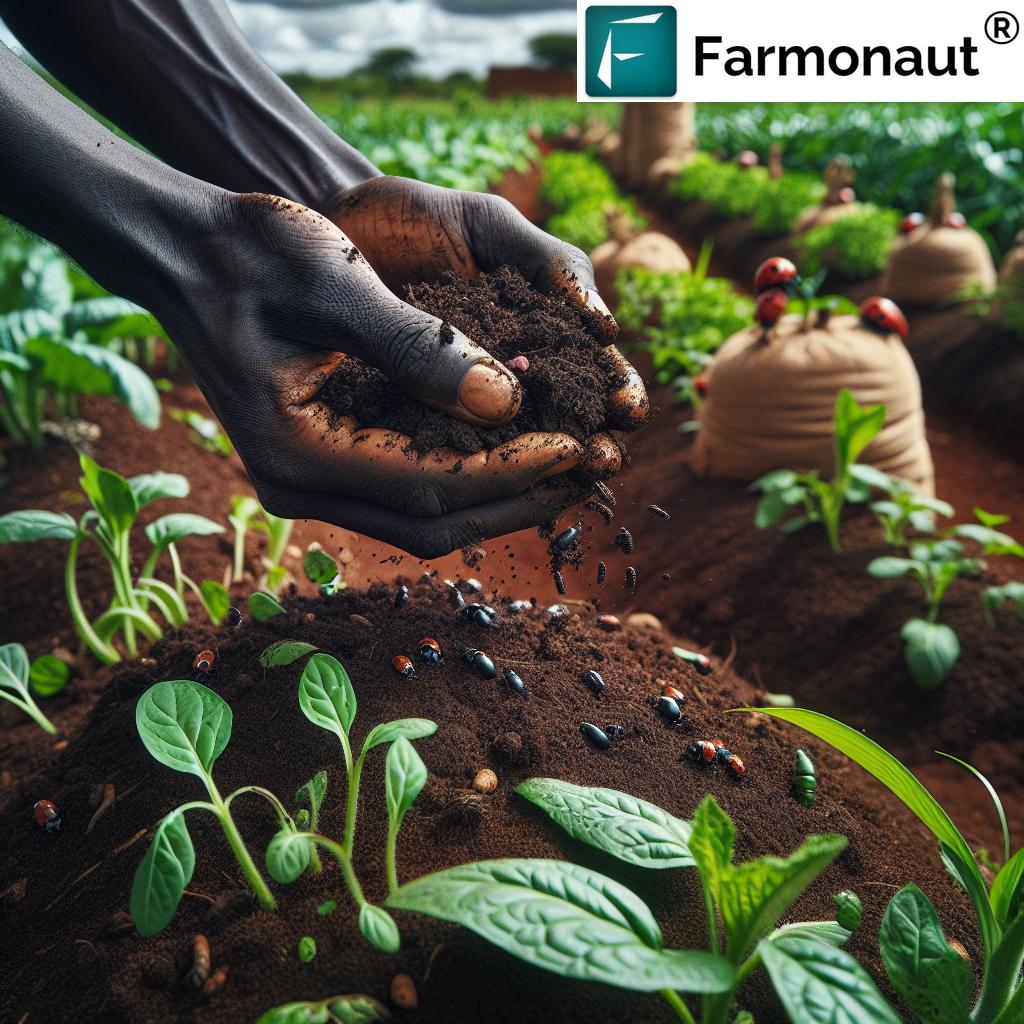Table of Contents
- Introduction
- Era Organics: Overview & Significance
- The Origins of Organic Farming in Africa
- Principles & Organic Farming Practices
- 7 Sustainable Farming Methods in Africa
- Comparative Methods Performance Table
- Economic & Environmental Impact
- Farmonaut’s Role in Sustainable Agriculture
- Conclusion
- FAQ: Era Organics & Organic Farming in Africa
“Organic farming can increase soil biodiversity by up to 30% compared to conventional methods in African agriculture.”
Era Organics: 7 Sustainable Farming Methods Africa
Sustainable agriculture is more than a global trend—it’s a necessity for a thriving future in Africa and around the world. As concerns arise over soil health, biodiversity, economic development, and human wellbeing, organic farming practices and sustainable agriculture methods stand at the forefront of the agricultural transformation. In this comprehensive guide, we explore “Era Organics,” a term that not only encapsulates a global movement but also represents key players—like Era Organics Inc. and Era Farms—driving change within the African agriculture sector.
This article outlines the evolution, principles, and benefits of organic farming. We analyze its impact on African communities, environmental balance, consumer markets, and economic growth, offering a deep dive into 7 proven sustainable farming methods that are shaping a greener, more resilient future across Africa.
Era Organics: Overview & Significance
The term Era Organics spans far beyond just a name—it encapsulates a whole ecosystem of organic agriculture, sustainable farming methods, and eco-friendly product innovation. Let’s break down its dual significance:
1. Era Organics Inc.: Natural Skincare as a Reflection of Organic Principles
Era Organics Inc. specializes in organic skin and hair care products, combining science with nature. Their product line includes lotions, creams, shampoos, conditioners, and more—all formulated using plant-based, non-toxic, food-grade, chemical-free ingredients:
- No harsh chemicals, dyes, or perfumes
- Free from parabens and toxins
- Allergenic-safe formulations
- Focus on sustainability and ethical sourcing
Their approach echoes the core principles of organic farming, serving as a model for businesses that balance ecological and economic impact with consumer safety.
Explore Era Organics Inc. here
2. Era Farms: Advancing Organic Food Production in Africa
Era Farms represents a modern agricultural initiative focused on the organic farming practices essential to Africa’s fight against food insecurity. Their key goals include:
- Eradicating hunger through consistent supply of fresh, organic produce
- Supporting sustainable agriculture systems
- Promoting self-sufficiency at the community and national levels
- Generating economic opportunities and stable jobs
This initiative is an outstanding example of how greenhouse cultivation, organic food production, and sustainable resource management work synergistically within the African context.
Learn more about Era Farms in Africa
Unlocking Soil Organic Carbon: The Secret to Sustainable Farming with Farmonaut
The Origins of Organic Farming in Africa
The foundation of organic agriculture in Africa intertwines historical traditions and modern innovation. While the global movement traces back to early 20th-century Europe in reaction to synthetic fertilizers and pesticides, African communities have long practiced natural, chemical-free farming rooted in:
- Local knowledge and indigenous practices
- Use of green manure, compost, and crop rotation
- Integrated pest and weed management systems for ecological balance
- Promotion of biological diversity to safeguard soil fertility
The shift to synthetic chemicals in 19th and 20th-century agriculture was criticized for causing soil degradation and environmental harm. Influencers like Albert Howard and Rachel Carson helped galvanize a global return to organic principles, sparking a movement that now thrives in Africa’s agricultural sector.
Farmonaut – STEI Foundation Africa Collaboration
Principles & Organic Farming Practices
Organic farming in Africa is anchored by four guiding principles:
- Health: Soil, plant, animal, and human health are inseparable
- Ecology: Farming systems must function in harmony with natural cycles
- Fairness: Create equitable relationships across consumer markets, farmers, and the environment
- Care: Safeguard resources for present and future generations
Essential Organic Farming Practices
- Crop Rotation Benefits: Practiced for centuries in African agriculture, crop rotation boosts soil fertility, disrupts pest cycles, and maintains biodiversity. By shifting crops yearly (e.g., legumes followed by grains), farmers enhance soil structure and reduce dependency on synthetic inputs.
- Soil Fertility Management: Building healthy soil is pivotal. Techniques include composting animal and plant waste, applying green manure, and minimizing tillage—key to chemical-free farming and biological enrichment.
- Natural Pest Control & Biological Pest Management: Instead of synthetic pesticides, organic food production uses natural pest control—predatory insects, traps, neem oil, and crop diversity to manage pests sustainably and safely.
- Exclusion of Genetically Modified Organisms (GMOs): Organic farming systems in Africa explicitly avoid GMOs, preserving genetic diversity and natural resilience in crops and the environment.
- Diversified Planting & Mixed Farming: Planting a range of crops together or integrating livestock fosters ecological balance and maximizes resource use—a core part of Africa’s sustainable agricultural systems.
The goal is a holistic, closed-loop approach that supports human and environmental health, economic prosperity, and robust ecological diversity.
7 Sustainable Farming Methods in Africa
Africa’s diverse landscape, climate, and population needs demand adaptable, sustainable agricultural methods. Here are seven proven organic and sustainable farming systems practiced across the continent, each optimized for food security, economic growth, and environmental stewardship.
“Sustainable agriculture methods can boost smallholder farmers’ incomes by 20% while reducing chemical use in Africa.”
1. Organic Crop Rotation
Crop rotation is the alternating of plant families in successive seasons. For example: legumes one year, grains the next—each improving the soil for the next. This method replenishes nutrients, improves soil structure, naturally manages pests, and enhances yield stability. In African contexts, rotating maize, beans, and sorghum is a common sustainable cycle.
2. Intercropping & Companion Planting
Intercropping (growing different crops together) and companion planting (strategically pairing crops with mutual benefits) effectively optimize space, boost biodiversity, and provide organic pest control. Typical African combinations include maize-bean-pumpkin or millet-groundnut.
3. Agroforestry
Agroforestry integrates trees, shrubs, and crops or livestock in the same system, mimicking natural ecosystems. The shade, nutrients, and protection provided by acacia or moringa trees, for instance, help regenerate soil, increase crop resilience, and diversify income sources—critical in African semi-arid regions.
4. Green Manuring & Composting
African farmers traditionally utilize green manure crops (such as vetch or cowpea) and compost to restore organic matter and “feed” beneficial soil organisms. This enhances soil fertility and water retention for future crops, reducing dependency on synthetic fertilizers and minimizing environmental impact.
5. Integrated Pest Management (IPM) with Natural Pest Control
Integrated Pest Management (IPM) relies on biological, physical, and cultural controls—like encouraging beneficial insects, timed planting, traps, and natural repellents. By embracing chemical-free farming, IPM protects crops, minimizes risk, and sustains long-term yields even in pest-prone African environments.
6. Organic Greenhouse Farming
Greenhouse farming, increasingly prominent in urban and peri-urban Africa, allows for controlled, chemical-free production of high-value vegetables and fruits year-round. It supports resource conservation, organic food production, and market access for smallholder farmers.
7. Conservation Agriculture
Conservation agriculture is a holistic system that minimizes soil disturbance (no-till or reduced-till), maintains soil cover (cover crops, residues), and supports rotation. Especially effective in sub-Saharan Africa, it generates soil fertility improvement, carbon sequestration, and higher profitability over time.
Africa Green Impact: Sustainable Solutions for Central Africa
Interested in maximizing sustainable crop and forest management? Our Crop, Plantation & Forest Advisory offers real-time satellite data, AI advisories, and actionable insights—empowering better ecological balance and yield optimization without harmful chemicals.
Comparative Methods Performance Table: 7 Sustainable Farming Methods Africa
| Method Name | Description | Estimated Soil Health Improvement (%) | Impact on Biodiversity | Estimated Yield Increase (%) | Initial Investment Cost | Economic Benefit (USD/ha/year) |
|---|---|---|---|---|---|---|
| Crop Rotation | Alternating crops annually to improve soil nutrients and disrupt pest cycles | +22% | High | +12% | Low | $400 |
| Intercropping/Companion Planting | Simultaneous cultivation of two or more crops offering mutual benefit | +17% | High | +10% | Low | $350 |
| Agroforestry | Integrating trees with crops and/or livestock | +27% | High | +15% | Medium | $900 |
| Green Manure & Composting | Using cover crops and organic waste to enrich and restore soil | +25% | Medium | +8% | Low | $420 |
| Integrated Pest Management (IPM) | Combining natural and manual pest control with ecological balance | +14% | Medium | +5% | Low | $220 |
| Organic Greenhouse Farming | Protected cultivation with organic principles for high-value crops | +20% | Medium | +25% | High | $1,500 |
| Conservation Agriculture | No/minimal tillage, permanent soil cover, and crop rotation | +28% | High | +20% | Medium | $720 |
Note: Values are approximate, based on regional practices, published studies, and may vary by agro-ecological zone and management practices.
Farmonaut: Organic Carbon Data Accuracy & Soil Monitoring
Developers and agronomists can easily integrate real-time satellite crop, soil, and weather data for sustainable agriculture solutions through Farmonaut’s Crop & Weather API.
Find complete documentation for streamlined implementation: Farmonaut API Developer Docs
Economic & Environmental Impact of Organic Farming in Africa
Economic Growth & Consumer Market Development
- Global organic product sales exceeded $150 billion in 2022, indicating strong international and African consumer demand for healthy, chemical-free & sustainably produced goods.
- Farmers using organic farming practices often receive premium prices and benefit from lower input expenditures (less synthetic fertilizer, less pesticide).
- Growing domestic and export markets for organic food production offer new revenue channels, rural job creation, and improved living standards.
- Challenges: Some methods may see lower initial yields than conventional approaches but improve long-term sustainability and cost-effectiveness.
Environmental & Ecological Impact
- Biodiversity conservation: Sustainable farms foster more varied species of plants, insects, and microorganisms.
- Soil health & fertility: Methods like composting, green manuring, and crop rotation rebuild organic matter and microbe communities, reducing erosion and enhancing water retention.
- Reduced chemical use: Lower environmental and health risks due to elimination of synthetic pesticides, fertilizers, and herbicides.
- Climate change mitigation: Increased soil carbon sequestration through conservation agriculture practices and agroforestry.
Many African governments, NGOs, and private-sector initiatives are actively promoting these sustainable approaches for robust, scalable food systems benefiting both current and future generations.
Reduce the environmental impact of agriculture with Farmonaut’s Carbon Footprinting Module. This feature delivers real-time data for carbon emissions, helping farms and agribusinesses meet sustainability goals and regulatory compliance.
Farmonaut’s Role in Sustainable Agriculture & Digital Transformation
We, at Farmonaut, are committed to making precision agriculture and sustainable farm management accessible and affordable for all African farmers and agribusinesses through advanced technology solutions.
- Real-time Crop & Soil Health Monitoring: Satellite imagery offers direct, remote insight into crop vigor (NDVI), soil moisture, pest activity, and disease risks, enabling more timely and precise organic and sustainable interventions.
- Jeevn AI Advisory Systems: Personalized, data-driven recommendations delivered via mobile/web help optimize irrigation, fertilization, and pest management in alignment with organic principles—significantly improving productivity and resilience.
- Blockchain-Based Product Traceability: With increasing global consumer demand for transparent and chemical-free goods, our Product Traceability Solution ensures that every stage from field to market is documented—boosting market confidence and brand reputation.
- Support for Financial Access: Satellite-based verification expedites Crop Loan & Insurance processes, enabling African farmers to invest in sustainable methods with minimized risk.
- Fleet & Resource Management: Our Fleet Management tool increases logistical efficiency and cut operational costs for agribusinesses, amplifying both economic and ecological impact.
This all-in-one approach transforms challenges into opportunities—elevating the economic, environmental, and social returns of organic and sustainable agriculture across Africa.
For cooperatives and governments, Large-Scale Farm Management capabilities allow for multi-farm, multi-region digital oversight—improving scalability and maximizing sustainable agricultural systems’ success.
Conclusion: Building Africa’s Agricultural Future with Era Organics
“Era Organics” is more than a brand or a company—it’s a call to action for Africa’s agricultural sector and beyond. By adopting organic farming practices, sustainable agriculture methods, and innovative digital solutions, African farmers are rewriting the narrative: from environmental degradation to ecological regeneration; from chemical dependency to natural resilience; from economic struggle to opportunity.
As organic food markets expand and awareness of environmental, social, and health impacts grows, our adoption of these proven, sustainable models will define Africa’s agricultural future—and inspire the world. The journey demands partnership, education, and continuous improvement; but the rewards—a robust, biodiverse, and equitable food system—are well worth harvesting.
Let’s cultivate a greener, healthier, and more prosperous tomorrow, together.
FAQ: Era Organics & Organic Farming in Africa
1. What is the main goal of organic farming in Africa?
The primary aim is to produce nutritious, chemical-free food while restoring soil health, protecting the environment, and boosting economic resilience. Organic farming practices foster biodiversity and reduce reliance on synthetic inputs, creating more resilient food systems for the continent.
2. Which sustainable farming method is most common in African agriculture?
Crop rotation and intercropping are among the most commonly practiced. These methods offer soil fertility management, natural pest control, and reduce environmental impact.
3. How does Farmonaut support sustainable agriculture?
Farmonaut provides advanced digital solutions for real-time crop and soil monitoring, AI-driven advisories, blockchain-based traceability, and efficient resource management—all accessible via mobile and web platforms. Our approach empowers farmers and agribusinesses to make informed, sustainable, and profitable decisions.
4. Are there certified organic farms in Africa?
Yes, the number of certified organic farms in Africa is growing rapidly, fueled by both domestic consumption and export opportunities. Initiatives like Era Farms are leading examples.
5. How does organic farming impact African consumer markets?
African consumer markets are seeing increasing demand for fresh, natural, certified organic products that are chemical-free, healthy, and environmentally friendly.
6. Where can I access Farmonaut’s precision agriculture tools?
Through our Web App, Android App, iOS App, and API integrations.













